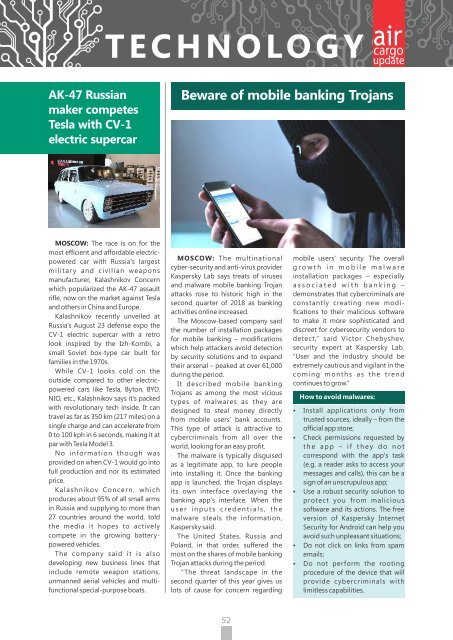ACU Sep-2018_Final Artwork LR
Create successful ePaper yourself
Turn your PDF publications into a flip-book with our unique Google optimized e-Paper software.
T E C H N O LO G Y<br />
AK-47 Russian<br />
maker competes<br />
Tesla with CV-1<br />
electric supercar<br />
Beware of mobile banking Trojans<br />
MOSCOW: The race is on for the<br />
most efficient and affordable electricpowered<br />
car with Russia's largest<br />
militar y and civilian weapons<br />
manufacturer, Kalashnikov Concern<br />
which popularized the AK-47 assault<br />
rifle, now on the market against Tesla<br />
and others in China and Europe.<br />
Kalashnikov recently unveiled at<br />
Russia's August 23 defense expo the<br />
CV-1 electric supercar with a retro<br />
look inspired by the Izh-Kombi, a<br />
small Soviet box-type car built for<br />
families in the 1970s.<br />
While CV-1 looks cold on the<br />
outside compared to other electricpowered<br />
cars like Tesla, Byton, BYD,<br />
NIO, etc., Kalashnikov says it's packed<br />
with revolutionary tech inside. It can<br />
travel as far as 350 km (217 miles) on a<br />
single charge and can accelerate from<br />
0 to 100 kph in 6 seconds, making it at<br />
par with Tesla Model 3.<br />
No information though was<br />
provided on when CV-1 would go into<br />
full production and nor its estimated<br />
price.<br />
Kalashnikov Concern, which<br />
produces about 95% of all small arms<br />
in Russia and supplying to more than<br />
27 countries around the world, told<br />
the media it hopes to actively<br />
compete in the growing batterypowered<br />
vehicles.<br />
The company said it is also<br />
developing new business lines that<br />
include remote weapon stations,<br />
unmanned aerial vehicles and multifunctional<br />
special-purpose boats.<br />
MOSCOW: The multinational<br />
cyber-security and anti-virus provider<br />
Kaspersky Lab says treats of viruses<br />
and malware mobile banking Trojan<br />
attacks rose to historic high in the<br />
second quarter of <strong>2018</strong> as banking<br />
activities online increased.<br />
The Moscow-based company said<br />
the number of installation packages<br />
for mobile banking – modifications<br />
which help attackers avoid detection<br />
by security solutions and to expand<br />
their arsenal – peaked at over 61,000<br />
during the period.<br />
It described mobile banking<br />
Trojans as among the most vicious<br />
types of malwares as they are<br />
designed to steal money directly<br />
from mobile users' bank accounts.<br />
This type of attack is attractive to<br />
cybercriminals from all over the<br />
world, looking for an easy profit.<br />
The malware is typically disguised<br />
as a legitimate app, to lure people<br />
into installing it. Once the banking<br />
app is launched, the Trojan displays<br />
its own interface overlaying the<br />
banking app's interface. When the<br />
u s e r i n p u t s c r e d e n t i a l s , t h e<br />
malware steals the information,<br />
Kaspersky said.<br />
The United States, Russia and<br />
Poland, in that order, suffered the<br />
most on the shares of mobile banking<br />
Trojan attacks during the period.<br />
“The threat landscape in the<br />
second quarter of this year gives us<br />
lots of cause for concern regarding<br />
mobile users' security. The overall<br />
g r o w t h i n m o b i l e m a l w a r e<br />
installation packages – especially<br />
a s s o c i a t e d w i t h b a n k i n g –<br />
demonstrates that cybercriminals are<br />
constantly creating new modifications<br />
to their malicious software<br />
to make it more sophisticated and<br />
discreet for cybersecurity vendors to<br />
detect,” said Victor Chebyshev,<br />
security expert at Kaspersky Lab.<br />
“User and the industry should be<br />
extremely cautious and vigilant in the<br />
c o m i n g m o n t h s a s t h e t re n d<br />
continues to grow.”<br />
Ÿ<br />
Ÿ<br />
Ÿ<br />
Ÿ<br />
Ÿ<br />
How to avoid malwares:<br />
Install applications only from<br />
trusted sources, ideally – from the<br />
official app store;<br />
Check permissions requested by<br />
t h e a p p – i f t h e y d o n o t<br />
correspond with the app's task<br />
(e.g. a reader asks to access your<br />
messages and calls), this can be a<br />
sign of an unscrupulous app;<br />
Use a robust security solution to<br />
protect you from malicious<br />
software and its actions. The free<br />
version of Kaspersky Internet<br />
Security for Android can help you<br />
avoid such unpleasant situations;<br />
Do not click on links from spam<br />
emails;<br />
Do not perform the rooting<br />
procedure of the device that will<br />
provide cybercriminals with<br />
limitless capabilities.

















